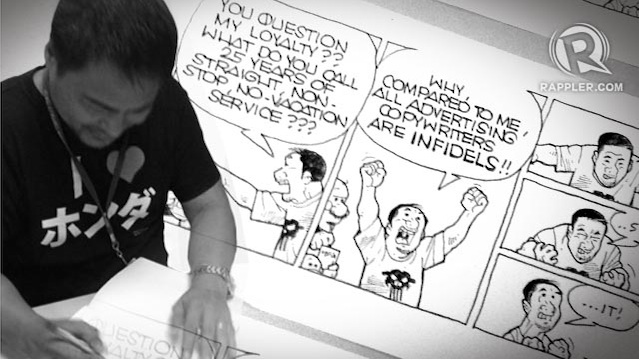SUMMARY
This is AI generated summarization, which may have errors. For context, always refer to the full article.

Pol Medina’s resignation from the Philippine Daily Inquirer has once again highlighted freedom of speech and gender. How much freedom is there in freedom? Where does it begin and where does it end? Is being lesbian still considered immoral? Are homosexual relationships still offensive?
Pugad Baboy has always been a comic strip meant for satire. For more than two decades, it has become a source of entertainment. At the same time it has allowed people to think critically.
By the comic strip’s very nature, Pol Medina’s exercise of his freedom of speech involves bringing to light issues that are of societal importance — in the comic strip that caused Medina to resign, it was the hypocrisy of the Catholic Church on LGBT issues. Medina cited Catholic schools, specifically St Scholastica’s College (SSC), as an example.
SSC took offense, prompting their president to write the Philippine Daily Inquirer (PDI), asking for an apology and demanding investigation of the incident. The PDI was quick to apologize and to suspend publication of the comic strip, after which Pol Medina resigned.
Why take offense?
There are two main issues that need to be tackled here: first, that SSC took offense with Medina’s strip that said the school allowed its students to have homosexual relationships; and second, that the PDI suspended Medina because a certain group took offense with what was meant to be a satire.
Why did SSC take offense with Medina saying that the school allowed homosexual relationships? Could it be because even progressive Catholic institutions such as SSC still look at homosexual relationships and being lesbian as immoral and offensive?
As a Scholastican myself, I found it amusing how very few fellow Scholasticans reacted violently to Medina’s comic strip. Most of us laughed, knowing what was written was somehow true. Yes, it was a generalization but we knew very well what he meant. I am more curious about those who were offended. Were they offended to have been called lesbians without being one? And had it been the other way around, would lesbians have been offended if they were called straight?
Are we still trying to conceal what has been known to many all these years? Where is the offense when Medina only put into words and visuals what has been true all these years: that there are many lesbians in all-girls schools and that they are in homosexual relationships? Is this truth offensive? Or should SSC have been proud to be cited as an institution that allows gender equality?
There lies the hypocrisy Medina pointed out: that an institution known to be one of the pioneers of a gender program in the Philippines has taken offense for allegedly allowing students to have homosexual relationships. This makes us wonder, where did all the lectures on gender equality go?
No longer fearless
The next question is, why did the PDI cave in to pressure to suspend Medina? Their tagline, “Dare to ask. Be an Inquirer” now seems daft. Here lies the danger of PDI’s actions: that the newspaper has lost its boldness and fearlessness, more afraid to offend than it is afraid for its readers to become boxed in a set of values and ideologies. This, instead of questioning societal standards.

Isn’t it ironic how this very same newspaper that stood up against Martial Law and the Marcoses has decided to bow down to an institution like the Church?
At the heart of Pol Medina’s Pugad Baboy is always a hint of truth. And unless we are ready to face it, we will continue to be offended. But only when we learn to accept who we are as a people can we be open to change towards a more progressive and just society.
And this is supposed to be the mandate of the media — to continue exposing truths, to challenge the minds of the public, to allow people to become critical thinkers until norms that are no longer relevant are bent or broken and a new culture is created. Once the media ceases to do this, we will become a group of people who think the same way. We might as well have lived in George Orwell’s fictional world of 1984.
As an organization of artists, Dakila stands by Pol Medina and Pugad Baboy. We believe that every artist should be responsible for his reality. His art may not change the world, but it can change the way we view the world.
Medina’s role is not to please any group of people, but to expose the truth to the public, hard as it may be to digest. – Rappler.com
Renee Juliene Karunungan, 23, is the spokesperson and a council member of Dakila-Philippine Collective for Modern Heroism. Dakila supports LGBT rights and celebrates with the community this Pride Month.
Add a comment
How does this make you feel?
There are no comments yet. Add your comment to start the conversation.